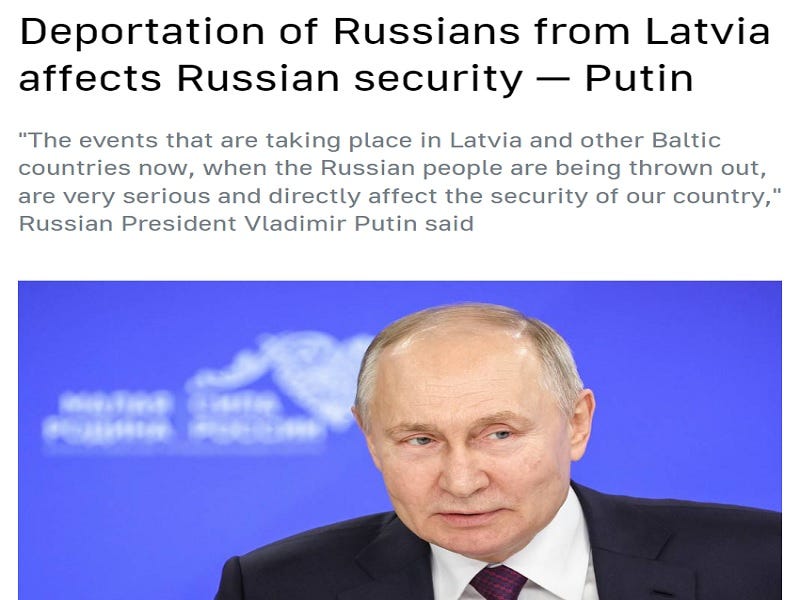This thought exercise shouldn’t be misinterpreted as suggesting that a NATO-Russian war in the Baltics (and possibly stretching into the Arctic via new member Finland) is inevitable, but just that a chain reaction might soon occur whereby events resemble Germany’s scenario forecast, though without being Russia’s fault.
Bild cited leaked classified documents from the Defense Ministry to recently report that Germany is preparing for war with Russia, the narrative impact of which was analyzed here as advancing the “military Schengen” proposal put forth by German NATO logistics chief Sollfrank last November. As the name implies, this concept aims to optimize bureaucracy and logistics across the bloc in order to turn it into a single military space, all with the intent of facilitating military movements towards Russia’s border.
According to Bild’s report, the German Defense Ministry’s scenario forecast predicts that Russia will encourage its co-ethnics in the Baltic States to riot by sometime this summer, which will then set into motion a larger crisis with NATO. The innuendo is that they have no legitimate grievances and would only be doing this at the Kremlin’s urging, but the reality is that they’re considered second-class citizens in Estonia and Latvia, thus giving them grounds to peacefully protest at any time in support of more rights.
Lativa might be about to get the ball rolling given its impending deportation of nearly 1,000 Russian nationals who failed to meet last year’s strict language proficiency standards for renewing their residency documents. Estonian Public Broadcasting reported last September that there are 25,000 Russian citizens there so it wouldn’t be any small matter for so many to possibly be deported, hence why President Putin just said that this is “very serious and directly affect[s] the security of our country.”
It also can’t be ruled out that this latest move will precede the deportation of Latvia’s “non-citizen” Russian minority who are essentially stateless since they never received their historical homeland’s citizenship nor their birthplace’s after failing to meet the latter’s strict language requirements. They’re around one-third of Latvia’s Russian minority who are themselves about one-quarter of the population, which equates to approximately 130,000 people on top of the previously mentioned 25,000.
Over 8% of Latvia’s present population might therefore be eligible for deportation in the scenario that this country expands its strict language proficiency standards to legally designated “non-citizens”. Criticism from fellow EU members on human rights grounds could potentially be counteracted by fearmongering about the security implications of letting them remain in Latvia per the German Defense Ministry’s scenario forecast that was cited by Bild in their scandalous report.
Those who still remain skeptical about the legitimacy of this speculative move could then be told that it’s still “much more humane” than Israel’s violent ethnic cleansing of the Palestinians from Gaza and that Russia could easily accept its co-ethnics at any time just like Egypt and Jordan could easily accept theirs. This manipulative perception management tactic omits the fact that both the Baltics’ Russians and Gaza’s Palestinians were born there and that coercing them to move is literal ethnic cleansing.
Circling back to the latest move that President Putin described as “very serious and directly affect[s] the security of our country”, it can’t be taken for granted that Latvia’s approximately 130,000 “non-citizen” Russians will politically mobilize, though it’s possible if they interpret this as a signal that they’re next. That could happen independently of any encouragement from the Kremlin, which would prefer for them to live where they were born unless they choose to voluntarily move back to their historical homeland.
Nevertheless, any independent political mobilization on this second-class community’s part is already being spun in advance as “Kremlin-managed” and could be placed in the context of the German Defense Ministry’s scenario forecast in order to maximally fearmonger about the implications. That could in turn serve as the faux security-related pretext for promulgating secretly preplanned legislation for their deportation as well as accelerating plans for implementing the “military Schengen”.
Estonia might coordinate any such move with Latvia due to what it could claim are security-related concerns about its own Russian minority, which has comparatively better rights than in that neighboring nation and most of whom are recognized as Estonian citizens. Should that happen, then Finland could get swept up in this rapidly emerging crisis due to its kindred ties with Estonia and newfound membership in NATO, which more than doubled the bloc’s border with Russia.
It was assessed late November that “Finland Is Hellbent On Positioning Itself As A Frontline NATO State Against Russia”, and late last month it was observed that “CNN Is Lying About Who’s Responsible For Opening The Arctic Front Of The New Cold War”, which narratively preconditioned Westerners for this. Out of solidarity with Estonia, Finland could request an unprecedented number of NATO troops and equipment, facilitated as they might be by the “military Schengen’s” possible implementation by then.
This thought exercise shouldn’t be misinterpreted as suggesting that a NATO-Russian war in the Baltics (and possibly stretching into the Arctic via new member Finland) is inevitable, but just that a chain reaction might soon occur whereby events ominously resemble Germany’s scenario forecast. Instead of being Russia’s fault, however, the West itself would be to blame and would want all of this to unfold to ethnically cleanse Russians from the Baltics, militarize the Arctic, and midwife the “military Schengen”.




